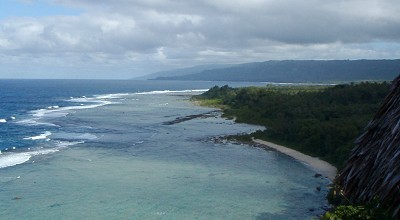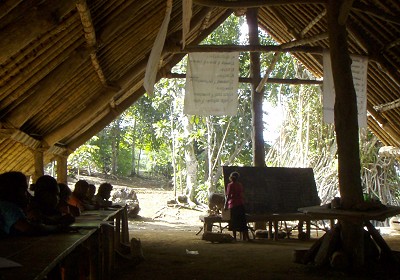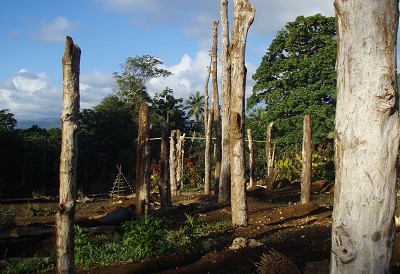
Piggy banking
In a remote corner of the South Pacific lives an unusual banking chief who claims to have the answer to the world's economic problems. But could the chief's traditional bank be heading for a crisis of its own?
Lavatmanggemu is an unlikely place for a bank to have its headquarters. An earthy village of thatched buildings and brown dirt floors, it sits hidden in the greenery of a mountainside draped in rainforest. On the shoreline below the village, the Pacific Ocean thunders against the reef with a roar that can be heard halfway up the mountain. Warm tropical winds, blowing unimpeded across thousands of miles of water, drench the coast in humidity and rain. The road to Lavatmanggemu is so bad that I was forced to walk twenty miles to get there - no driver would take me for an affordable price. The community's only other contact with the outside world is through the local 'phone booth', a bamboo hut perched on a cliff top in the one spot where mobile phones can pick up a signal.
Yet since 1983, Lavatmanggemu has been home to a revolutionary new bank. Named Tangbunia, after the giant baskets in which local people traditionally stored their valuables, the bank has over a dozen branches, and assets reported to be worth millions of pounds, all managed from its jungle headquarters. Now, with the world's economy in crisis, the bank's founder believes that his unique model offers a way not only to help raise his own small country out of poverty, but to restore financial stability to the rest of the world.
When the South Pacific republic of Vanuatu won its independence in 1980, the islanders' initial optimism for their future was short-lived. Their new nation may have gained political freedom, but economically it remained horribly dependent on the outside world. The islanders' fortunes fluctuated along with the world market for beach holidays and dried coconuts and, with such a small economic base, any scheme requiring serious money - such as the much-needed rebuilding of dilapidated schools and roads - relied on the generosity of foreign donors. To explain away the country's continued poverty, its politicians seized on a new catchphrase: economic independence. Only when this had been achieved, they claimed, could Vanuatu gain prosperity. Having succeeded in one independence struggle, the new nation embarked on another - with little idea of how it might be won.

The coastline near Lavatmanggemu
One person who came up with an answer was Chief Viraleo Boborenvanua. Younger than most village chiefs, Viraleo had little formal education, but his penetrating mind and an almost religious sense of self-belief made him a natural leader. To achieve prosperity, the chief argued, Vanuatu must abandon the Western economic system which had served it so badly, and restore the traditional systems of trade and exchange that had existed since before the arrival of the white man.
In pre-colonial Vanuatu, the basic unit of currency was the pig. Pigs were - and in many parts of the islands, still are - used to settle any customary debt, from the bride prices paid at weddings to the fines paid by villagers found guilty of breaking taboos. Pigs are also expended on the lavish ceremonies through which aspiring local men rise through the social hierarchy. Those unable to meet their debts borrow pigs from richer neighbours, to be paid back later with interest. Particularly valued are the tusks of large boars whose upper teeth have been knocked out so that the lower ones grow in an elaborate whorl.
As a form of money, pigs have some advantages. By growing and reproducing they naturally accrue interest over time, their habit of squealing and biting at strangers safeguards them against theft, and unlike banknotes, they have an intrinsic value: you can eat them. However, they are hardly a suitable basis for a 21st century economy. For one thing, they are inconvenient: you cannot put a pig in your wallet. Pigs also need food and living space, and are liable to die or escape if they are not well looked after. In the Western economy, nobody ever faced bankruptcy because the contents of his account had broken free and run wild in the local forest. There is also no humane way to subdivide a pig into smaller units of currency. For small transactions, the islanders do have alternative forms of money, such as long dyed mats, but these too are cumbersome. Finally, there is the problem of liquidity: sometimes a perfectly creditworthy individual in need of a pig of a certain value might simply fail to find one available for loan.
In his home village of Lavatmanggemu, Chief Viraleo solved these problems by establishing a 'traditional bank' at which spare pigs and pigs' tusks can be deposited - a literal piggy bank. These are then lent out at a profit, enabling the bank to pay back its savers with a hefty 15% rate of interest. The bank issues chequebooks and allows transfers between accounts, eliminating the need for pigs to be physically dragged from place to place whenever a transaction is made. Dyed mats and other traditional items of value can also be deposited. To provide a standard way of reckoning these varied forms of money, the bank uses its own currency: livatu, or "tusk-money", a unit equal to the value of one fully-curved boar's tusk. The livatu can be exchanged with the vatu, Vanuatu's official currency, at a rate of 18,000 vatu to the livatu, a rate which values the livatu at just over a hundred pounds. Despite high-profile negotiations, the Vanuatu government has yet to give formal recognition to the livatu, yet the new currency has held its value over time, and Chief Viraleo claims that his bank has gone from strength to strength.

Inside the meeting house at Lavatmanggemu
"Other banks in the world are failing, but not ours," he told me. "The Tangbunia bank is solid, because it is based on tradition."
We were lunching on roast breadfruit together in the chief's meeting house, a building the size of a gymnasium made from tree trunks overhung with a triangular roof of palm thatch, its ends open to the jungle. By local standards, it was a huge construction, and on a cleared patch of ground next door, posts were already being erected for an even bigger one. Banks everywhere build imposing headquarters: it conveys to their customers a reassuring sense of permanence.
At one end of the meeting house, students with notebooks and pencils were having an accounting lesson. Chief Viraleo's establishment at Lavatmanggemu is not merely a bank, it is also a school, to which students come from all over the island to learn the chief's unique philosophy. Viraleo, meanwhile, has travelled all over the world, attending meetings in New York, London and Geneva, to promote the concept of traditional banking. With Western banks in crisis, he believes that now is the time for the wider world to embrace his ideas.
"You can help," he told me. "Go back to Britain and tell people that they are on the wrong path. Go and help lead a revolution."
Sitting in a jungle headquarters in the presence of a charismatic leader and being encouraged to lead a revolution is intoxicating; I had a brief sense of how Che Guevara may once have felt. However, I failed to see how the world's financial crisis could be solved with pigs.
"Britain's economy is far too advanced for that," I explained. "Besides, using pigs as money is not part of our culture."
"Of course," said Viraleo. "Each country in the world will have to look to its own traditions, and work out its own form of traditional banking. But in every country there will be a way."
What were Britain's traditions, I wondered? The ancient roots of Western currencies lie in precious metals: in the days of William the Conqueror, one pound sterling meant a pound's weight of sterling-quality silver. Yet, whilst there are indeed investors who take refuge in gold and silver at times of financial crisis, nobody would advocate a return to the days when those with debts to pay hauled their cash in clinking bags of silver, keeping a lookout for highwaymen along the road.
"Once upon a time, people from Britain came to Vanuatu and taught us many things," Chief Viraleo went on. "But now the time has come for the rest of the world to learn from Vanuatu."
"If I tell people in Britain to follow Vanuatu's example, they will laugh," I told him. "Vanuatu is a Third World country. Your roads are unpaved; your villages have no electricity; your children die of malaria. Why would anyone want to follow that example?"
Other people around the meeting house were listening now. The chief smiled. He was enjoying the debate.
"All that will change. Soon Vanuatu will achieve traditional economic independence."
"How?"
"At the end of this year, our bank will inject 600 million livatu into the economy."
I gasped. The sum proposed by Chief Viraleo was only slightly less than that being printed by the Bank of England to help ease the credit crunch, and Britain's quantitative easing was taking place in an economy thousands of times the size.
"Does that mean there will be an extra 600 million pigs' tusks? How is that possible?" It takes seven years of careful hand-rearing to raise a pig with fully curved tusks, which is why the tusks are so valuable.
"With our banking system in place we no longer need real pigs. This will just be money in an account."
"But if banks simply produce money out of nowhere, it will lose its value," I protested.
"One livatu is worth 18,000 vatu. Everybody knows that."
"But people won't accept your money."
"Of course they will. They always have up until now. It's rooted in our tradition."
All of a sudden, Lavatmanggemu seemed horribly close to home. I looked at the huge new building under construction outside, and thought of the Royal Bank of Scotland's shiny new headquarters on the outskirts of Edinburgh. Far from being a solution to the financial crisis, here it was in miniature: an ambitious banking chief, flushed with his past success, overreaching himself so catastrophically that it endangered not only his bank but his island's entire economy, and refusing to heed those who warned him of impending disaster. I tried.

The future of capitalism? - The site of the new headquarters of the Tangbunia bank
I left Lavatmanggemu wondering if there really was anything useful that the Western world could learn from Chief Viraleo, and what would become of his bizarre experiment in banking. Would his grand plan to boost his country's economy amount to nothing, a boast that would never be fulfilled, or would it go ahead and bring about the collapse of his bank? Might the Tangbunia bank end up damaging the very traditions on which it was founded?
When Chief Viraleo claimed that his bank was safe because it was different from Western ones, being based on something as solid and traditional as pigs, in a way he was right. In an economy based on real pigs, there is little room for hubris and speculation: there is a natural limit to the number of pigs you can rear in a village. But somewhere along the way the chief had missed the point, and now his bank was in danger of becoming just another glorified financial institution whose worth on paper was no longer anchored to anything tangible and real; not so very different at all. Eventually the illusion would fail, and those who had believed it would get a harsh lesson in what money really represents. Perhaps all that would be left behind would be the posts of a half-finished building, rotting in a South Pacific jungle - the ultimate symbol of how global the financial crisis has become.